Over the last two years, ethnic violence by Islamists and hostility has been mounting in Indonesia against the ethnic Chinese.
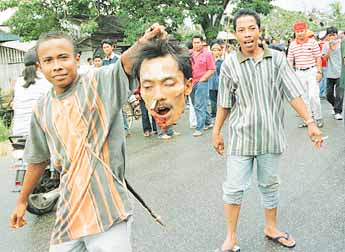 The underlying causes of increasing tensions include political instability, economic problems, and the remnants of the government's policy on transmigration.
The underlying causes of increasing tensions include political instability, economic problems, and the remnants of the government's policy on transmigration.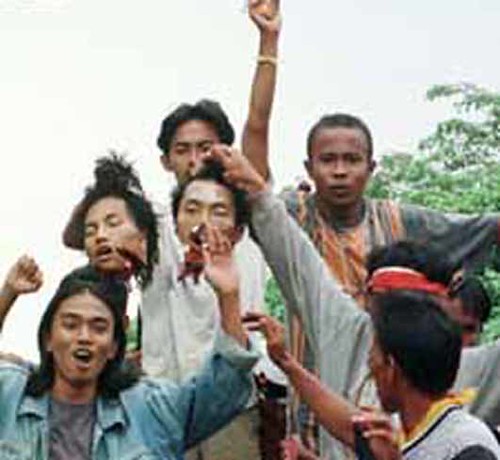 Heightened ethnic tensions, especially against the Chinese, are partially a result of economic scarcity following the Asian financial crisis. And a great example of "Islam the Religion of Peace" in action.
Heightened ethnic tensions, especially against the Chinese, are partially a result of economic scarcity following the Asian financial crisis. And a great example of "Islam the Religion of Peace" in action. Although the ethnic Chinese comprise only around 4% of the population, before the financial crisis they accounted for the majority of private economic wealth and activity.
Although the ethnic Chinese comprise only around 4% of the population, before the financial crisis they accounted for the majority of private economic wealth and activity. 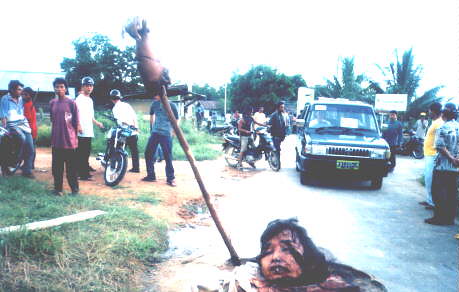 This is partly due to the Dutch colonial legacy of using the ethnic Chinese as "middlemen".
This is partly due to the Dutch colonial legacy of using the ethnic Chinese as "middlemen". 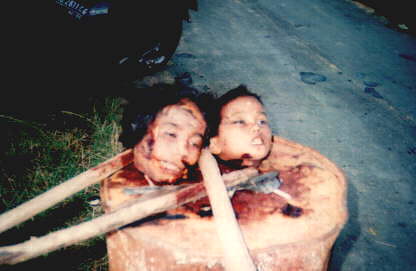 While some of the Chinese control large amounts of money, there are also many lower and working class ethnic Chinese. They get raped in the streets by Islamists anyway, too.
While some of the Chinese control large amounts of money, there are also many lower and working class ethnic Chinese. They get raped in the streets by Islamists anyway, too.
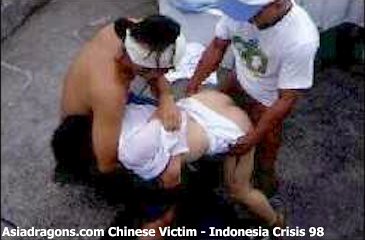
In just a couple of months the spring of 1998, around 1,200 Chinese were tortured or killed and many businesses were looted or destroyed. Bodies were left in the streets.Usually impaled for viewing on poles.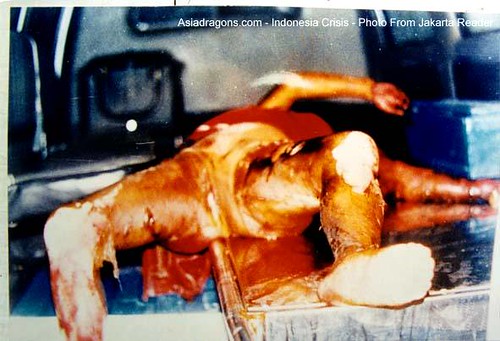
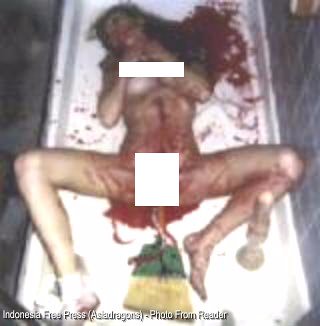
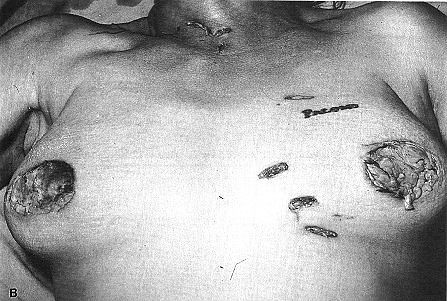 Since then, an estimated 150,000 ethnic Chinese have fled the country, taking their assets with them, although some have since returned. Many of them never made it out.
Since then, an estimated 150,000 ethnic Chinese have fled the country, taking their assets with them, although some have since returned. Many of them never made it out.
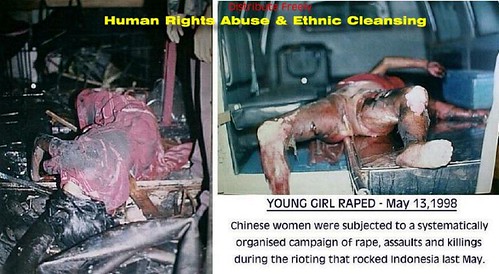
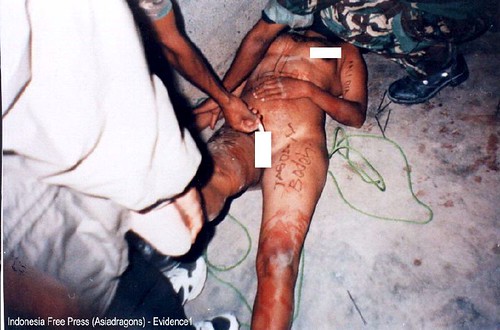
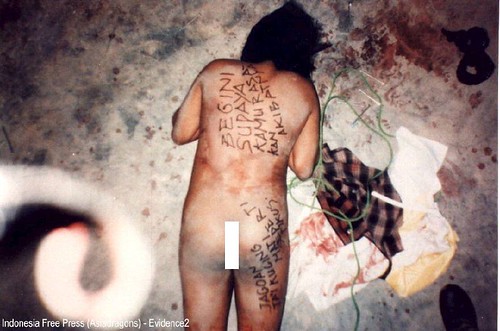



Although conditions are better now, the environment remains unsupportive with roughly 50 laws and ordinances considered to be discriminatory toward Chinese-Indonesians.
Moslems enjoying their lives at the beach in their own restricted way, which they want to force on you and me - or we must DIE horribly!
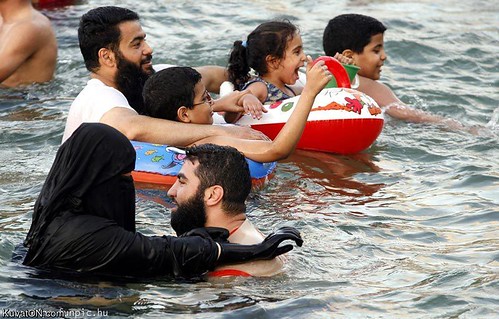 Indonesia has faced problems of religious and ethnic violence throughout its history as a country with hundreds of ethnic groups scattered among more than 6,000 islands.
Indonesia has faced problems of religious and ethnic violence throughout its history as a country with hundreds of ethnic groups scattered among more than 6,000 islands.
Multiculturalism
Indonesia is a very diverse country. There are over 300 ethnic groups speaking 250 languages spread over more than 6,000 islands. It is also a nation comprised of multiple religious groups. While over 90% of the people are Muslim, there are also Protestants, Catholics, Hindus, Buddhists, and other native religions.
Although Indonesia has suffered underlying religious and ethnic tensions, it was once considered to be a model for multiculturalism and religious tolerance. The national slogan is Bhinneka Tunggal Ika or "Unity in Diversity."
Under the military dictatorship of Suharto the religious and ethnic hostilities were relatively subdued due to rapid economic growth. However, since the end of the Suharto regime, triggered by the 1997-98 financial crisis, ethnic and religious tensions have been rising.
There is hostility against people of Chinese dissent primarily due to perceived and real economic disparities.
Religious conflicts have also flared in Maluku between Muslims and Christians, leaving over 5,000 people dead and around 500,000 displaced.
The government faces the difficult task of trying to hold a large diverse nation together. Increased freedom under a democratic government has meant more people speaking out and asserting their ethnic and religious identities.
Managing the diversity of Indonesia is a challenge the nation must face to ensure the stability of the region. Ethnic Diversity There are over 300 ethnic groups in Indonesia.
The largest group is the Javanese, who comprise approximately 45% of the population. Other ethnic groups include the Sundanese 14%, Madurese 7.5%, Malays 7.5% with other ethnicities comprising 26% of the population.
While there are many regional languages and dialects, most Indonesians speak the official language, Bahasa Indonesia, originally a minority language used by traders throughout the country.
In many areas of the country people of various ethnicities live side by side in relative harmony. However, areas such as Kalimantan and West Papua are marked by ethnic hostility and violence. The ethnic Chinese have also been the target of ethnic hostility.
Religion
Religion plays an essential role in the violent conflicts that plague Indonesia today. These conflicts include an inter-religious clash between Christians and Muslims, most recently centered in Maluku; and intra-religious clashes between opposing Muslim groups.
The rise of Islam within Indonesian politics began to cause a more serious rift in the country in the 1990s. The military split into nationalist and Islamic camps over the issue of whether Indonesia should be increasingly Islamicized.
Nationalists like General Wiranto were in favor of a secular state, while Islamists like Lt. Gen. Prabowo were in favor of strengthening Islamicization.
As Islamic forces increased their political power, violence against Christians by extreme Muslim factions also increased. In Maluku, rising tensions between the Christian and Muslim communities turned violent, sparked by a fight between a taxi driver and residents in an Ambon neighborhood.
Subsequently, the city became segregated in Christian and Muslim neighborhoods and the violence spread to the countryside.
The ongoing conflict has caused 5,000 deaths. Although the two parties have signed a cease-fire, violence continues to erupt.
The Islamicisation of Maluku, Indonesia Inter-Muslim Issues.
While Indonesia is predominantly a Muslim country, it is not free of the divides present in other areas of the Islamic world. These divides are made explicit by the fact that Islam lacks a centralized hierarchy of leadership from which official interpretations of religious principles can be obtained.
This allows for greater variety within the tradition itself.
In addition to the split within the military, another fissure in Indonesian society is the clash between the traditionalists and the modernists.
The traditionalists, who mostly live in rural areas of the country, are considered more open to foreigners and other religious faiths.
The modernists, while accepting and incorporating many Western educational and philosophical ideas, are considered more exclusive of other faiths and ethnicities.
Muslim groups, including the militant Islam Defenders Front (FPI) and Indonesian Muslim Student Action Group (KAMMI) took to the streets in protest of U.S. action in Afghanistan pressing Megawati to oppose such action.
While such protests have since subsided, it remains an issue.
Indonesia's Muslim Divide: Past and Present Government Response
Part of the problem in Maluku stems from accusations that the Indonesian government, police, and military directly supported the hostilities, or at least failed to prevent them. Some reports mentioned that security forces stood idly by while Muslim groups attacked Christians or burned down churches and homes.
Reports state that these same forces actively participated in the violence.
Many people have called for the government to step in and prevent further aggression, but this is accompanied by a growing fear that Indonesia is being Islamicized to a greater degree than before, and that the government and military are helping to plan and coordinate the violence.
With regard to the intra-Muslim divide, the government and military find themselves facing the same rift as Indonesian society. The president's hesitancy to speak out illustrates the fine balance between powerful Moslem groups, the traditional moderate form of Islam, and the secular state.
Challenges
Religious divides within Indonesia can easily support and polarize political issues, blurring the dividing line between the intra-Muslim and the Muslim-Christian conflicts. The combination of religious fervor and convictions coupled with political and military power creates a situation that must be handled with great care in order to prevent further bloodshed.
Due to the fact that Indonesia has faced several different secessionist movements in the recent past, violence and tensions between religious communities only raises the risk that the country might split.
The inter-religious tension worsens an increasingly sensitive situation in Indonesia where the government and its people face multiple threats to the integrity of the country.
Causes of Hostilities
Over the last two years, ethnic violence and hostility has been mounting in Indonesia. The underlying causes of increasing tensions include political instability, economic problems, and the remnants of the government's policy on transmigration.
Heightened ethnic tensions, especially against the Chinese, are partially a result of economic scarcity following the Asian financial crisis. Although the ethnic Chinese comprise only around 4% of the population, before the financial crisis they accounted for the majority of private economic wealth and activity. This is partly due to the Dutch colonial legacy of using the ethnic Chinese as "middlemen".
While some of the Chinese control large amounts of money, there are also many lower and working class ethnic Chinese. In the spring of 1998, around 1,200 Chinese were tortured or killed and many businesses were looted or destroyed.
Since then, an estimated 150,000 ethnic Chinese have fled the country, taking their assets with them, although some have since returned.
Although conditions are better now, the environment remains unsupportive with roughly 50 laws and ordinances considered to be discriminatory toward Chinese-Indonesians.
Another cause for the rising ethnic violence is the Transmigration Program instituted by former President Suharto. The resettlement project was designed to move people from densely populated islands to some of the less habited ones. Migrants were given land, housing, and access to education and healthcare.
The indigenous people often resented the new migrants, and felt that their land and culture were being invaded. The transmigration policy has led to many clashes between the migrants and the indigenous people in various regions of the country.
View more information on the impact of the Transmigration Program
FULL TEXT (without graphics)
http://www.preventconflict.org/portal/main/background_intergroup_relations.php
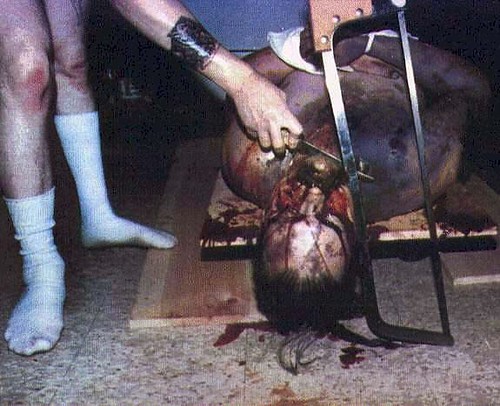
1. The CIA put the military into power in Indonesia. The military (both Christian and Moslem generals)use 'Moslem' militias such as Laskar Jihad to do their dirty work.
ReplyDelete2. Many thousands of Indonesian Moslems have been killed by Indonesian Christians.
3. Much of the fighting is related to gangsterism - Christian gangs (connected to certain military factions) versus Moslem gangs (connected to certain military factions) fighting over territory.
4. The Indonesian general who led the invasion of East Timor was a Christian.
4. The Ayatollahs in Iran were put into power by the CIA and MI6.
1. Around 1999, thousands of Moslems were killed by Christians in Indonesian Borneo. The Christian Dayaks cut off the heads of lots of Moslem Madurese.
ReplyDelete2. In the Indonesian Moluccas, Christians massacred about 500 Moslem villagers at the end of December 1999
The above 2 posts were obviously written by Muslims trying desperately to defend their barbaric and violent religion - Islam, by blaming the Christians. If its not the Jews, they blame the Christians - same ole, same ole crap. There is NO such thing as "Christian gangs" in Indonesia. Christians don't go around killing anyone for the sake of some moon god called "allah" nor are they instructed to do so by their own religiom. The Ayatollahs were NOT put into power by either the CIA or M16. ALL Islamic countries have dictators whom the Muslims adore. And if by chance they don't, they assassinate them!! Just like they did with Bhutto recently. Stop LYING! Christians don't go around 'beheading" anyone - THAT IS A MUSLIM PRACTISE - mandated by their Koran. Its about time you Muslims WOKE up to the fact that your own Mohammad was a TERRORIST himself, a murderer, a rapist, a thief and a Pedophile! No wonder the Muslim terrorists are just like him!!
ReplyDeleteThe above 2 posts were obviously written by Muslims trying desperately to defend their barbaric and violent religion - Islam, by blaming the Christians. If its not the Jews, they blame the Christians - same ole, same ole crap. There is NO such thing as "Christian gangs" in Indonesia. Christians don't go around killing anyone for the sake of some moon god called "allah" nor are they instructed to do so by their own religiom. The Ayatollahs were NOT put into power by either the CIA or M16. ALL Islamic countries have dictators whom the Muslims adore. And if by chance they don't, they assassinate them!! Just like they did with Bhutto recently. Stop LYING! Christians don't go around 'beheading" anyone - THAT IS A MUSLIM PRACTISE - mandated by their Koran. Its about time you Muslims WOKE up to the fact that your own Mohammad was a TERRORIST himself, a murderer, a rapist, a thief and a Pedophile! No wonder the Muslim terrorists are just like him!!
ReplyDeleteIslam never teach such brutal things. They maybe me ignorant animals, but not Muslim!
ReplyDelete"if you like to demolish the mosque,
demolish it!
if you like to demolish the temple,
demolish it!
but never demolish the heart of a Human being!
As God lives in the hearts of human beings!"
Bulleh Shah, The Mystic Poet of Islam
good work christian missioneries..
ReplyDeletewhat anon said was true. many people from other country got wrong information. 1998 tragedy was true, but honestly from 1998 - 1999 there were thousands moslems killed by christians, and unfortunetly the government didnot do anything.
ReplyDelete1st and 2nd photos are some evidences Christian Dayaks cut off the heads of lots of Moslem